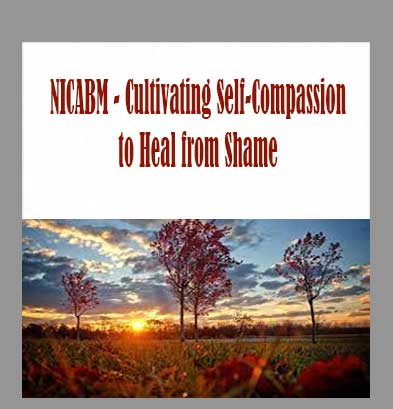NICABM – Cultivating Self-Compassion to Heal from Shame
Description
NICABM – Cultivating Self-Compassion to Heal from Shame download, NICABM – Cultivating Self-Compassion to Heal from Shame review, NICABM – Cultivating Self-Compassion to Heal from Shame free
NICABM – Cultivating Self-Compassion to Heal from Shame
When a client is drowning in shame, there’s one powerful lifeline we can use to help pull them out of it – it’s compassion-oriented therapy.
To do it effectively, we need to know:
- specific compassion-based strategies that can transform the “threat-focused shame mind”
- the distinctive drivers that feed the shame cycle
- why compassion-oriented therapy is uniquely effective for healing shame – even after traditional treatments have fallen short
That’s why we asked 12 of the world’s top experts to share their best strategies for integrating compassion-based interventions into their work with shame, to bring you . . .
Cultivating Self-Compassion to Help Your Client Heal from Shame
Channeling the Power of Self-Compassion to Break a Cycle of Shame
Deborah Lee, DClinPsy Christopher Germer, PhD Dennis Tirch, PhD Paul Gilbert, PhD Laura Silberstein-Tirch, PsyD Christopher Willard, PsyD Kristin Neff, PhD
- One Critical Starting Point for Helping Clients Stuck in Shame and Self-Criticism
- A Specific Metaphor to Help Crystallize Your Client’s Understanding of How Self-Compassion Can Heal Shame
- A Key Revelation About Compassion and the “Threat-Focused Shame Mind”
- Distinguishing External Shame from Internal Shame (and How Each One Might Impact Treatment)
Compassion-Based Strategies to Shift How Your Client Experiences Shame
Susan Pollak, MTS, EdD Christopher Willard, PsyD Deborah Lee, DClinPsy Christopher Germer, PhD Kristin Neff, PhD
- The Simple But Powerful Process That Can Move Your Client Out of Reactivity
- Two Ways to Help Your Client Neutralize and Depersonalize Shame
- How to Tell Whether You’re Striking the “Right Tempo” When Working with Shame
- An In-Depth Look at What Feeds the Shame Cycle (and How to Help Clients Dismantle It)
- One Simple Imagery Exercise to Help Clients “Retire” Their Inner Critic
The Common Challenges of Integrating Self-Compassion Work into the Treatment of Shame (and Ways to Address Them)
Deborah Lee, DClinPsy Paul Gilbert, PhD Dennis Tirch, PhD Kristin Neff, PhD Laura Silberstein-Tirch, PsyD
- A Practical Application to Help Clients Move from Judging Shame to Understanding It
- Key Questions to Help Clients Understand the Function of an Inner Critic
- An Expert Workaround for When a Client Struggles to Develop a Compassionate Self
- Case Study: Using Functional Analysis and Imagery to Move a Client Out of Self-Criticism and into Self-Correction
Practical Applications to Orient Your Client Away from Shame and Toward Self-Acceptance
Dennis Tirch, PhD Christopher Germer, PhD Paul Gilbert, PhD Jack Kornfield, PhD
- A Step-by-Step Guide to Helping Clients Create a Corrective Emotional Experience
- One Expert Technique to Help You Notice When Cognitive Interventions May Be Falling Short
- Using the “Two Schools” Metaphor to Introduce Your Client to Self-Compassion Work
- Tone Training – What It Is, How to Do It, and Why It’s So Effective in Helping Clients Accept Self-Compassion
Critical Insights for Using Self-Compassion to Work with Shame
Kelly McGonigal, PhD Ron Siegel, PsyD Ruth Buczynski, PhD
- Using the Three Paradoxes of Shame to Help Crystallize Your Client’s Understanding of It
- Redefining a Common Misconception of the Inner Critic
- Two Key Aspects of Suffering (and How Shame Is Deeply Embedded In Each)
- An Analogy to Help Your Client Understand the Relationship Between Shame and Self-Compassion
Expert Strategies for Transforming Shame with Self-Compassion
Rick Hanson, PhD Deborah Lee, DClinPsy Ashley Vigil-Otero, PsyD
- How to Help Your Client Feel More Comfortable Talking About Shame
- Three Techniques to Help Clients Let Go of an Inner Critic
- A 3-Part “Investigative” Method to Help Clients Work with Their Inner Critic
CHRIS GERMER, PHD
Co-developer of the Mindful Self-Compassion (MSC) program; Founding faculty member of the Institute for Meditation and Psychotherapy and the Center for Mindfulness and Compassion; Lecturer on psychiatry (part-time) at Harvard Medical School.
KRISTIN NEFF, PHD
Professor of Human Development and Culture, Educational Psychology Dept, University of Texas at Austin; Expert in Self Compassion.
DENNIS TIRCH, PHD
Founding Director of The Center for Compassion Focused Therapy; President of The Compassionate Mind Foundation of North America; co-author of Experiencing ACT from the Inside Out: A Self-Practice/Self-Reflection Workbook for Therapists.
JACK KORNFIELD, PHD
Co-founder of the Insight Meditation Society and Spirit Rock Meditation Center; Author of The Wise Heart and Bringing Home the Dharma: Awakening Right Where You Are.
DEBORAH LEE, DCLINPSY
Consultant clinical psychologist at Berkshire Traumatic Stress Service; honorary senior lecturer at University College London; co-author of The Compassionate-Mind Guide to Recovering from Trauma and PTSD.
CHRISTOPHER WILLARD, PSYD
Psychologist and educational consultant specializing in mindfulness; president of the Mindfulness in Education Network; serves on the board of directors at the Institute for Meditation and Psychotherapy.
RICK HANSON, PHD
Senior Fellow of the Greater Good Science Center at UC Berkeley; New York Times bestselling author of Hardwiring Happiness and Buddha’s Brain.
SUSAN POLLAK, MTS, EDD
Licensed clinical psychologist in private practice; co-founder and teacher at the Center for Mindfulness and Compassion at Harvard Medical School/Cambridge Health Alliance; author of Self-Compassion for Parents: Nurture Your Child by Caring for Yourself.
RON SIEGEL, PSYD
Assistant Professor of Psychology, part time, Harvard Medical School; Author of The Mindfulness Solution: Everyday Practices for Everyday Problems and Sitting Together: Essential Skills for Mindfulness-Based Psychotherapy.
KELLY MCGONIGAL, PHD
Health psychologist and lecturer at Stanford University; Author of The Upside of Stress: Why Stress Is Good for You and How to Get Good At It and The Willpower Instinct: How Self-Control Works, Why It Matters, and What You Can Do to Get More of It.
PAUL GILBERT, PHD
Professor of Clinical Psychology at the University of Derby in the UK; World renowned for his work on compassion and compassion focused therapy; Author of The Compassionate Mind: A New Approach to Life’s Challenges.
LAURA SILBERSTEIN-TIRCH, PSYD
Founding Director of The Center for Compassion Focused Therapy; Adjunct Assistant Professor at the Ferkauf School of Psychology, Albert Einstein College of Medicine of Yeshiva University; co-author of The ACT Practitioner’s Guide to the Science of Compassion.
Course Director
Ruth Buczynski, PhD
Dr. Ruth Buczynski is a licensed psychologist and founder and president of The National Institute for the Clinical Application of Behavioral Medicine (NICABM). NICABM helps physicians, nurses, psychologists, social workers, and counselors – practitioners who have some of the most significant and life-changing missions on the planet – provide cutting-edge, research-based treatment strategies to their patients. For more than 25 years, NICABM has offered accredited training and professional development programs to thousands of practitioners worldwide.
Program Developer & Co-Host
Ashley Vigil-Otero, PsyD
Dr. Ashley Vigil-Otero is a licensed clinical psychologist and program developer at NICABM. Her education and experience include training at Harvard Medical School, Cambridge Health Alliance and Vanderbilt University. Dr. Vigil-Otero has a private practice in Florida, where she specializes in compassion-oriented psychotherapy with clients across the lifespan. She is passionate about raising public awareness on mental health, resilience, and well-being.
Here’s What You’ll Get:
- Everything is yours to keep forever in your professional library
- Downloadable videos so you can watch at your convenience, on any device
- Audio recordings you can download and listen to at home, in the car, at the gym or wherever you like
- TalkBack Segments to distill key ideas (this is where we “land” the session)
- Next Week in Your Practice sessions to give you concrete strategies to use with clients
- Professionally-formatted transcripts of the sessions, to make review and action simple
- Three downloadable bonus videos to help you integrate compassion-based interventions into your work with shame
Get 3 Bonuses When You Buy Today
Key Self-Compassion Practices That Can Help Your Client Be a Better Parent
Kristin Neff, PhD Susan Pollak, MTS, EdD Christopher Willard, PsyD Deborah Lee, DClinPsy
- How to Work with Clients Who Feel “Never Good Enough” As a Parent
- Simple Ways to Motivate Clients to Parent with More Kindness and Compassion Instead of Criticism
- One Exercise to Use with Clients Who Struggle with the Uncertainty of Parenting
- One Key Metaphor to Help Parents Distinguish Between Unconditional Love and Accepting Problematic Behavior
- Common Misconceptions About Compassionate Parenting (and the Ways Culture Can Condemn Compassion)
- One Meditation Practice to Help Parents Approach Anger with Compassion
Fresh Insights into Why We Self-Attack
Kristin Neff, PhD Paul Gilbert, PhD
- Evolutionary Explanations for Why We Self-Criticize
- Cultural Factors and Early Childhood Experiences that Can Lead to Self-Criticism
- Why Self-Attack Is a Type of Safety Function
When the Inner Critic is the Voice of an Abuser
Dennis Tirch, PhD
- How to Integrate Chair Work in Compassion-Focused Therapy
- The Power of Role-Play in Silencing an Inner Critic
- Compassionate Letter Writing as a Tool to Combat the Inner Critic
Plus, You’ll Get Practical Tools to Help You Take Action Immediately and Effectively
Synthesize Key Concepts So You Can Use Them Immediately
In the TalkBack Session, Ron Siegel, PsyD and Kelly McGonigal, PhD join me to dig more deeply into the key ideas. Our job is to make yours easier by streamlining the information and making sure each point is crystal clear. We’ll clarify critical concepts and break it all down so you can gain confidence in your understanding.
Discover Concrete Practices That Will Work in Your Life (and with Your Patients)
Then, with “next week” in mind, we’ll turn smart ideas into easy-to-use applications for your work. In Next Week in Your Practice, Rick Hanson, PhD Deborah Lee, DClinPsy join Ashley Vigil-Otero, PhD to give you specific practices and exercises based on each session. You’ll get strategies you can use with your clients right away.
Uncover Core Ideas and Techniques at-a-Glance So You Have a “Cheat Sheet” When You Need It Most
The QuickStart Guide will help you stay fresh and confident as you turn these teachings into action. We’ve gathered all the essential tools and methods from the program into a concise, easy-to-use guide so you can quickly review and apply these ideas when you need them most. It’s an at-a-glance reference to the most powerful concepts and strategies for working with clients who have shame.
Quickly Recall Crucial Details So You Can Apply Them with Confidence
Our Professional Transcript will help you reinforce key ideas so you can integrate them into your life and work. We’ve designed your transcript with an easy-to-use table of contents, clear, organized formatting, and helpful highlight quotes so you’ll have the information and exercises you need at your fingertips.
Here’s What Your Peers Have Experienced In NICABM Programs
. . . instrumental in opening my mind and heart to understanding trauma.
“These seminars have been instrumental in opening my mind and heart to understanding trauma. They are brief and accessible and of such high quality that I’ve been able to glean real understanding and a starting point for further study. I can’t say enough about them. I have recommended them to so many of my colleagues and they say the same things I do about them. Thank you Ruth!”
Angela Lawrence, Drug and Alcohol Counselor
British Columbia, Canada
. . . very cost effective and practical . . .
“These programs offer a broad spectrum of both information and specific guidelines with top experts in different fields of addressing human suffering. All in a very cost effective and practical way. Rather than thousands of dollars spent on the cost of conference I can learn in the comfort of my own home or office, on my own schedule. Certainly recommend any of these series to my colleagues.”
Ian Macnaughton, PhD, Psychotherapist
Vancouver, BC, Canada
My clients have been able to build their confidence. . .
“My clients have been able to build their confidence in their ability to self-regulate on their own in pretty difficult situations, including work and family of origin situations. Their success has then built their self-esteem as they can see that they can be successful in changing some fairly habitual ways of interacting and hurting themselves. It is a positive cycle that builds upon itself”
Nancy Lasater, MSW, LCSW
Boulder, CO
Why the Transcript Is Essential:
- The transcript makes it easy to go back and double check concepts, citations and names that are mentioned
- We put in a table of contents to make it easy for you to find the exact part of the webinar you need
- Having the concepts already written allows you to take notes on how you’re going to use the ideas rather than transcribing the ideas
- Some people simply learn better by reading than by listening or watching
- You will be able to print out and share techniques presented in the session with your patients
“I really liked being able to follow along with the transcripts as I listened…it was nice not to feel like I had to take notes. I really feel like I remember more when I both hear and see at the same time.”
Mary Ellen McNaughton, Masters in Counseling, Psychology Counselor
Kelowna, British Colombia, Canada
Frequently Asked Questions:
- Innovative Business Model:
- Embrace the reality of a genuine business! Our approach involves forming a group buy, where we collectively share the costs among members. Using these funds, we purchase sought-after courses from sale pages and make them accessible to individuals facing financial constraints. Despite potential reservations from the authors, our customers appreciate the affordability and accessibility we provide.
- The Legal Landscape: Yes and No:
- The legality of our operations falls into a gray area. While we lack explicit approval from the course authors for resale, there’s a technicality at play. When procuring the course, the author didn’t specify any restrictions on resale. This legal nuance presents both an opportunity for us and a boon for those seeking budget-friendly access.
- Quality Assurance: Unveiling the Real Deal:
- Delving into the heart of the matter – quality. Acquiring the course directly from the sale page ensures that all documents and materials are identical to those obtained through conventional means. However, our differentiator lies in going beyond personal study; we take an extra step by reselling. It’s important to note that we are not the official course providers, meaning certain premium services aren’t included in our package:
- No coaching calls or scheduled sessions with the author.
- No access to the author’s private Facebook group or web portal.
- No entry to the author’s exclusive membership forum.
- No direct email support from the author or their team.
We operate independently, aiming to bridge the affordability gap without the additional services offered by official course channels. Your understanding of our unique approach is greatly appreciated.
- Delving into the heart of the matter – quality. Acquiring the course directly from the sale page ensures that all documents and materials are identical to those obtained through conventional means. However, our differentiator lies in going beyond personal study; we take an extra step by reselling. It’s important to note that we are not the official course providers, meaning certain premium services aren’t included in our package:
Refund is acceptable:
- Firstly, item is not as explained
- Secondly, Item do not work the way it should.
- Thirdly, and most importantly, support extension can not be used.
Thank you for choosing us! We’re so happy that you feel comfortable enough with us to forward your business here.









Reviews
There are no reviews yet.